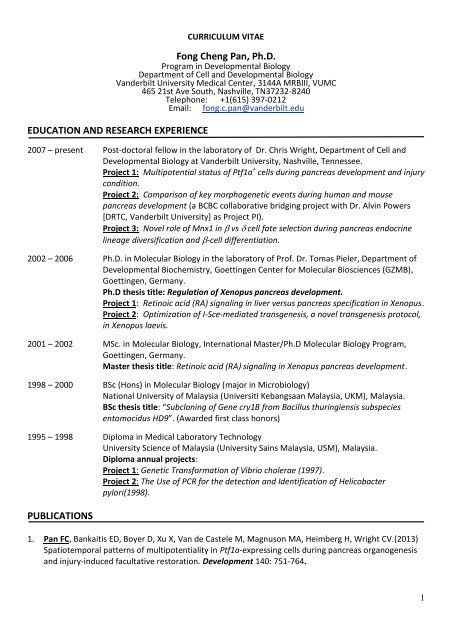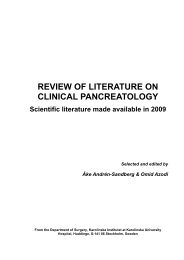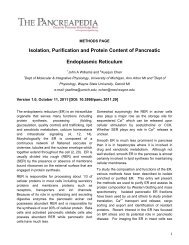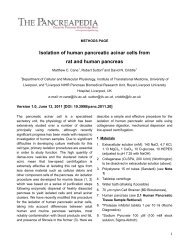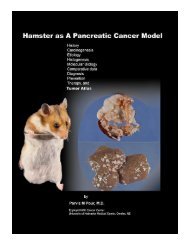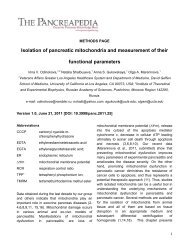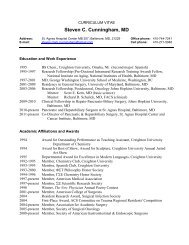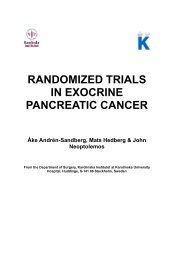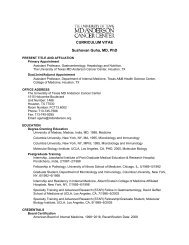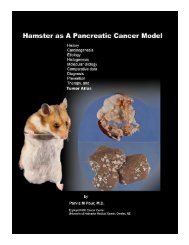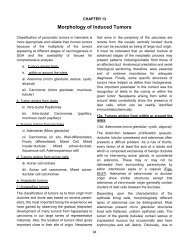CURRICULUM VITAE - The Pancreapedia
CURRICULUM VITAE - The Pancreapedia
CURRICULUM VITAE - The Pancreapedia
Create successful ePaper yourself
Turn your PDF publications into a flip-book with our unique Google optimized e-Paper software.
<strong>CURRICULUM</strong> <strong>VITAE</strong>Fong Cheng Pan, Ph.D.Program in Developmental BiologyDepartment of Cell and Developmental BiologyVanderbilt University Medical Center, 3144A MRBIII, VUMC465 21st Ave South, Nashville, TN37232-8240Telephone: +1(615) 397-0212Email: fong.c.pan@vanderbilt.eduEDUCATION AND RESEARCH EXPERIENCE2007 – present Post-doctoral fellow in the laboratory of Dr. Chris Wright, Department of Cell andDevelopmental Biology at Vanderbilt University, Nashville, Tennessee.Project 1: Multipotential status of Ptf1a + cells during pancreas development and injurycondition.Project 2: Comparison of key morphogenetic events during human and mousepancreas development (a BCBC collaborative bridging project with Dr. Alvin Powers[DRTC, Vanderbilt University] as Project PI).Project 3: Novel role of Mnx1 in vs cell fate selection during pancreas endocrinelineage diversification and -cell differentiation.2002 – 2006 Ph.D. in Molecular Biology in the laboratory of Prof. Dr. Tomas Pieler, Department ofDevelopmental Biochemistry, Goettingen Center for Molecular Biosciences (GZMB),Goettingen, Germany.Ph.D thesis title: Regulation of Xenopus pancreas development.Project 1: Retinoic acid (RA) signaling in liver versus pancreas specification in Xenopus.Project 2: Optimization of I-Sce-mediated transgenesis, a novel transgenesis protocol,in Xenopus laevis.2001 – 2002 MSc. in Molecular Biology, International Master/Ph.D Molecular Biology Program,Goettingen, Germany.Master thesis title: Retinoic acid (RA) signaling in Xenopus pancreas development.1998 – 2000 BSc (Hons) in Molecular Biology (major in Microbiology)National University of Malaysia (Universiti Kebangsaan Malaysia, UKM), Malaysia.BSc thesis title: “Subcloning of Gene cry1B from Bacillus thuringiensis subspeciesentomocidus HD9”. (Awarded first class honors)1995 – 1998 Diploma in Medical Laboratory TechnologyUniversity Science of Malaysia (University Sains Malaysia, USM), Malaysia.Diploma annual projects:Project 1: Genetic Transformation of Vibrio cholerae (1997).Project 2: <strong>The</strong> Use of PCR for the detection and Identification of Helicobacterpylori(1998).PUBLICATIONS1. Pan FC, Bankaitis ED, Boyer D, Xu X, Van de Castele M, Magnuson MA, Heimberg H, Wright CV.(2013)Spatiotemporal patterns of multipotentiality in Ptf1a-expressing cells during pancreas organogenesisand injury-induced facultative restoration. Development 140: 751-764.1
2. Kopp JL, von Figura G, Mayes E, Liu FF, Dubois CL, Morris JP 4th, Pan FC, Akiyama H, Wright CV, JensenK, Hebrok M, Sander M.(2012). Identification of Sox9-Dependent Acinar-to-Ductal Reprogramming asthe Principal Mechanism for Initiation of Pancreatic Ductal Adenocarcinoma. Cancer Cell. S1535-6108(12)00449-7.Contribution: Characterization of the major tool in this study, Ptf1a CreER knock-in allele. We have presentedlineage-tracing data obtained using Ptf1a CreER in various conferences and have convinced Dr. Sander to obtainPtf1a CreER line to perform these experiments prior to publication. We also helped in manuscript editing.3. Cai Q, Brissova M, Reinert RB, Pan FC, Brahmachary P, Shostak A, Radhika A, Poffenberger G, JeromeWG, Dumont DJ, Powers AC.(2012) Enhanced expression of VEGF-A in cells increases endothelialcell number but impairs islet morphogenesis and cell proliferation. Developmental Biology 367: 40-54.Contribution: Perform immunofluorescence analysis in Figure 2. I also helped in manuscript editing.4. Kopinke D, Brailsford M, Pan FC, Wright CV, Murtaugh LC. (2012) Ongoing Notch Signaling maintainsphenotypic fidelity in the adult exocrine pancreas. Developmental Biology. 362: 57-64.Contribution: Characterization and provide Ptf1a CreER line for deletion of RBJ knock out in adult acinar cells priorto publication. We also helped in manuscript editing.5. Dorrell C, Grompe MT, Pan FC, Zhong Y, Canaday PS, Shultz LD, Greiner DL, Wright CV, Streeter PR,Grompe M. (2011) Isolation of mouse pancreatic alpha, beta, duct and acinar populations with cellsurface markers. Mol Cell Endocrinol. 339: 144-150.Contribution: I helped to characterize ~50 monoclonal antibodies by immunofluorescence analysis onembryonic and adult pancreatic tissues. <strong>The</strong>se monoclonal antibodies were generated by the Grompe’s lab aspart of the collaboration within the Beta Cell Biology Consortium. Contribute to data in Figure 5. We also helpedin manuscript editing.6. Pan FC. Wright CV. (2011) Pancreas organogenesis: from bud to plexus to gland. DevelopmentalDynamics. 240: 530-565.7. Loeber J, Pan FC, Pieler T. (2009). Generation of transgenics frogs. Method in Molecular Biology. 561:65-72.8. Pan FC, Chen Y, Bayha E, Pieler T. (2007). Retinoic acid-mediated patterning of the pre-pancreaticendoderm in Xenopus operates via direct and indirect mechanisms. Mechanisms of Development.124(7-8):518-319. Pieler T, Pan FC, Afelik S, Chen Y. (2006). Molecular genetics of liver and pancreas development. InCell Signaling and Growth Factors in Development: From Molecules to Organogenesis (ed. K.Unsicker and K. Krieglstein), Vol. 2. pp. 823-840. Wiley-vch, Weinheim.10. Pan FC, Chen Y, Loeber J, Henningfeld K, Pieler T. (2005) I-SceI mediated transgenesis in Xenopus. .Developmental Dynamics 235: 247-252.11. Chen Y*, Pan FC*, Brandes N, Afelik S, Soelter M, Pieler T. (2004). Retinoic acid is essential forpancreas development and promotes endocrine at the expense of exocrine cell differentiation inXenopus. Developmental Biology 271: 144-160. (* equal contribution).12. Xu Y*, Pan FC*, Wright CV, Gu G. (2013). Adult pancreatic duct cells transdifferentiate to -like cellduring PDL-induced regeneration in the mouse. (* equal contribution) (Submitted to PLos One).2
13. Reinert RB, Brissova M, Shostak A, Pan FC, Poffenberger G, Kantz J, Thompson CS, Dai C, Powers AC.(2013). Vascular Growth Factor-A and Islet Vascularization are necessary in developing, but not adult,pancreatic islet. (accepted in Diabetes, article in press).14. Fleming JT, He W, Hao C, Ketova T, PanFC, Wright CV, Litingtung Y, Chiang C. (2013). <strong>The</strong> Purkinjeneuron acts as a central regulator of spatially and functionally distinct cerebellar precursors andastroglia. (pending review in Nature Neuroscience)MANUSCRIPT IN PREPARATION1. Pan FC, Pfaff S, Wright CV. Novel function of Mnx1 as a critical determinant in -versus -cell fateduring pancreatic endocrine lineage diversification.2. Brissova M*, Pan FC*, Hale M, diIorio P, Hara M, MacDonald R, Wright CV, Powers A. Human pancreasdevelopment: Key morphogenetic events during endocrine cell birth. (* equal contribution)HONORS AND AWARDS2002 – 2006 Georg Christoph Lichtenberg Stipend by Ministry for Science and Culture of Lower Saxony,Germany.2008 – 2009 Post-Doctoral fellowship by Juvenile Diabetes Research Foundation (JDRF).2008 Travel award by Vanderbilt Program in Developmental Biology to Keystone Symposium onMolecular and Cell Biology: Islet and Beta Cell Development and Transplantation, 2008.2010-2011 Postdoctoral Representative (elected position), Vanderbilt University Program inDevelopmental Biology (Nashville, TN)2012 National Institute of Diabetes and Digestive and kidney Diseases (NIDDK)/National Instituteon Aging (NIA) scholarship to Keystone Symposium on Advances in Islet Biology, 2012.TEACHING AND MENTORING EXPERIENCE2002 – 2006 (during graduate studies)1. Teaching assistant for practical course “Biochemistry” for medical student (4 semester, 10 days persemester).2. Teaching assistant for practical course I “Developmental Biology” for biology student (2003 – 2005, 1week each year).3. Teaching assistant for method course for the International MSc/PhD Molecular Biology Program’sstudents.a. “RNA-Protein interaction: UV-cross linking assay and Immunoprecipitation” (2004)b. “Sequencing and sequence Analysis: Bio-informatics” (2005)4. Supervised a lab rotation MSc student (8 weeks) from the International MSc/PhD Molecular BiologyProgram.5. Teaching assistant for advanced method course for PhD students from the International MSc/PhDMolecular Biology Program.a. “Techniques used to study Xenopus development” (2004)b. “I-SceI mediated transgenesis in Xenopus” (2005)2007 – present (during post-doctoral training)1. Supervised 2 lab rotation students (8 weeks) from the International Graduate Program(IGP) (2007).2. Supervised a lab rotation MSc students (8 weeks) from the IGP program (2009-2011)3
3. Teaching assistant for boot camp in “Xenopus embryology” for IGP students (2010).4. Training 5 entry level research assistants (2007-2013).5. Supervised a summer medical student (8 weeks) from the <strong>The</strong> Vanderbilt Summer Research TrainingProgram in Diabetes and Obesity, Kidney Disease, and Digestive Disease (2012).6. Training new users for Aperio Whole-slide Scanning Scope (and its associated algorithm) in the IsletProcurement and Analysis Core.SELECTED TALKS1. X-Omics Satelite meeting, October 2005, Obernai, France.- Retinoic acid signalling activities and pancreas specification in Xenopus.2. 1st Upper Midwest Islet Club (UMIC) Annual Meeting, Nashville, Tennessee (May 2008).- Lineage potency of Ptf1a-expressing cells during pancreas development.3. 15 th EASD Oxford Hagedorn workshop, Oxford, UK (August 2010).- Multipotent progenitor behaviour in pancreas organogenesis and injury-induced reprogrammingparadigms.4. 14 th and 15 th Vanderbilt Program in Developmental Biology Annual Retreat, Tennessee (2010, 2011).- Multipotent progenitor behaviour in pancreas organogenesis and injury-induced reprogrammingparadigms (2010).- Novel function of Mnx1 in endocrine lineage allocation, beta-cell maturation, and function (2011).5. 6 th Midwest Islet Club Conference. University Michigan, Michigan (May, 2013).- Mnx1 as a critical determinant in /δ cell fate selection during pancreatic endocrinediversification.INVITED TALKS1. Lund Stem Cell Center, Lund University, invited by Dr. Edgar Pera (June 2012).- Lineage interconversion between pancreatic cell types during pancreas organogenesis and injury.2. Institute of Medical Biology, A*STAR Biopolis, Singapore, invited by Dr. Norris R. Dunn (February2013).- Lineage interconversion between pancreatic cell types during pancreas organogenesis and injury.3. Infectious Disease Cluster, Advanced Medical and Dental Institute, Universiti Sains Malaysia, invitedby Dr. Tang <strong>The</strong>an Hock (February 2013).- Interconversion between pancreatic cell types in pancreas organogenesis and injury paradigms.SELECTED POSTERS1. Pan FC, Chen Y, Pieler T. I-Sce Mediated Transgenesis in Xenopus Laevis. 4 th German-Italian XenopusMeeting, Menaggio, Italy (October 2003).2. Pan FC, Chen Y, Pieler T. Retinoic acid signaling in Xenopus pancreas development. 16 th GermanSociety of Developmental Biology (Gfe) Scientific Meeting, Muenster, Germany (April 2005).3. Pan FC, Chen Y, Pieler T. Retinoic acid signaling in Xenopus pancreas development. <strong>The</strong> FrenchDevelopmental Biology Society (SFBD) meeting, Obernai, France (October 2005).4. Pan FC, Wright CV. Lineage potency and restriction of Ptf1a-expressing cells during pancreasdevelopment. Keystone Symposium on Molecular and Cell Biology: Islet and Beta Cell Developmentand Transplantation, Snowbird, Utah (April 2008).5. Pan FC, Bankaitis ED, Xu X, Heimberg H, Magnuson MA, Wright CV. Lineage potency of Ptf1aexpressingcells during pancreas development and regeneration. Beta Cell Biology Consortium (BCBC)Annual Investigator Retreat, Chantilly, VA (May 2009).4
6. Pan FC, Bankaitis ED, Xu X, Heimberg H, Magnuson MA, Wright CV. Ptf1a + acinar cellstransdifferentiate into ducts and produce islet -cells during pancreatic duct ligation (PDL)-inducedregeneration. Beta Cell Biology Consortium (BCBC) Annual Investigator Retreat, Bethesda, MD(February 2010).7. Pan FC, Pfaff S, Wright CV. Novel function of Mnx1 in endocrine lineage allocation, -cell maturationand function. Beta Cell Biology Consortium (BCBC) Annual Investigator Retreat, McLean, VA (May2011).8. Pan FC, Pfaff S, Wright CV. Positioning Mnx1 as a critical determinant in - versus -cell fate duringendocrine lineage diversification. Keystone Symposium on Advances in Islet Biology, Monterey,California (March 2012).9. Pan FC, Pfaff S, Wright CV. Mnx1 as a critical determinant in - versus -cell fate during endocrinelineage diversification. Copenhagen Bioscience conferences: <strong>The</strong> Stem Cell Niche – development anddisease, Copenhagen, Denmark (June 2012).10. Pan FC, Powers A, Pfaff S, Wright CV. Mnx1 as /δ cell fate selection during endocrine lineageallocation, -cell maturation and function. Beta Cell Biology Consortium (BCBC) Annual InvestigatorRetreat, Reston, VA (May 2013). (Selected as one of the 5 best posters for 5 min poster highlightpreview).5
REFERENCESChristopher V.E. Wright, D.PhilDirector, Vanderbilt University Program in Developmental BiologyProfessor, Department of Cell and Developmental BiologyVice-Chair for Faculty Affairs, Department of Cell and Developmental BiologyLouise B. McGavock Endowed Chair, Cell and Developmental Biology3140A MRB III, VUMC, 465 21st Avenue South,Nashville, TN 37232-8240, USAPhone: 615-343-8256FAX: 615-343-4539email: chris.wright@vanderbilt.eduAlvin C. Powers, M.D.Director Vanderbilt Diabetes CenterProfessor of MedicineProfessor of Molecular Physiology and BiophysicsJoe C. Davis Professor of Biomedical ScienceVanderbilt Diabetes Center802 Light Hall, Nashville, TN 37232-0202, USA.Phone: 615-936-7678email: al.powers@vanderbilt.eduRoland W. Stein, Ph.D.Professor of Molecular Physiology and BiophysicsProfessor of Cell and Developmental Biology723 Light Hall, 2215 Garland Avenue,Nashville, TN 37232-0615, USA.Phone: 615-322-7026Email: roland.stein@vanderbilt.eduMaureen Gannon, Ph.D.Associate ProfessorDepartment of Medicine, Division of Diabetes, Endocrinology and MetabolismDepartment of Molecular Physiology and BiophysicsDepartment of Cell and Developmental BiologyVanderbilt University Medical Center2215-B Garland Avenue, 7435 MRB IVNashville, TN 37232, USA.Phone: (615) 936-2676email: maureen.gannon@vanderbilt.edu6


